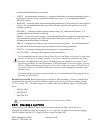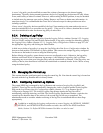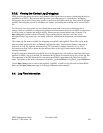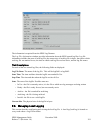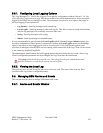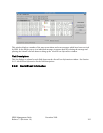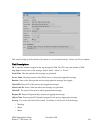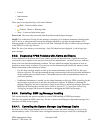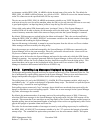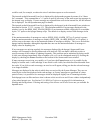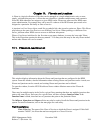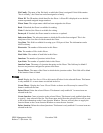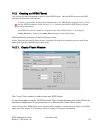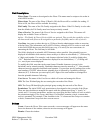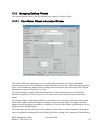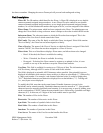environment variable HPSS_SSM_ALARMS with the desired name of the cache file. The default for
HPSS_SSM_ALARMS is defined in hpss_env_defs.h as NULL. SSM will revert to the internal memory
cache if it cannot access the specified cache file for any reason.
The site may set the HPSS_SSM_ALARMS environment variable to any UNIX file that has
read/write access for user root on the machine where the SM is to be run (since the SM runs as user root).
A good path might be /var/hpss/log/alarm_buffer to keep the log files all in one place.
Using a disk cache makes SSM alarms and events “persistent”; that is, if the System Manager is
restarted, SSM will be able to display all old messages still in the disk cache. Caching the alarms and
events in memory means the alarm cache starts out empty each time the System Manager is restarted.
By default, 2000 messages are cached before the oldest are discarded. This value can be modified by
setting the HPSS_SSM_ALARMS_DISPLAY environment variable to the desired number of messages
to be retained and restarting the System Manager.
Once an old message is discarded, it cannot be accessed anymore from the Alarms and Events window.
Older messages can be accessed by the delog utility.
Since the messages are cached and managed by the System Manager, all SSM users connected to the
System Manager will see the same messages. However, preferences selected on the Alarm and Event
Preferences window are applied on a user-by-user basis.
Messages can be delivered to the System Manager and stored in the cache only while the SSM System
Manager is running. Any messages generated while the System Manager is down will not be accessible
from the HPSS Alarms and Events window (but they should be accessible from the delog utility). This
means that there can be gaps in the list displayed in the Alarms and Events window if the System
Manager is shut down and restarted while the rest of HPSS is up.
9.6.4.2. Controlling Log Messages Displayed by hpssgui and hpssadm
The hpssgui and hpssadm programs each keep an internal cached copy of the Alarm and Event list. The
list is maintained by regular polling requests to the System Manager. Please review and reference the
hpssgui and hpssadm man pages for further details on the settings discussed in this section.
The polling interval is set by the HPSSSSM_UI_ALARM_RATE environment variable, which may be
overridden by the "-A" option to the hpssgui or hpssadm startup script. The default is to poll the System
Manager every 5 seconds for new log messages.
Each polling request returns only "new" messages, those which have not already been retrieved by the
hpssgui or hpssadm in a previous polling request. If there are no new messages in the System Manager
log cache, no messages are returned.
By default, the maximum number of messages retrieved by each polling request is 2000. If there are
more than 2000 new messages in the System Manager log message cache, only the 2000 newest will be
returned. This means that if new messages are arriving rapidly at the System Manager and the hpssgui or
hpssadm polling interval and maximum number of messages values are not set appropriately, there can be
gaps in the hpssgui or hpssadm Alarm and Event list.
The value for the maximum number of messages to return by each polling request may be redefined by
the HPSS_SSM_ALARM_GET environment variable or by the "-G" option to the hpssgui or hpssadm
startup script. The command line option takes precedence over the environment variable. This option
HPSS Management Guide November 2009
Release 7.3 (Revision 1.0) 306



